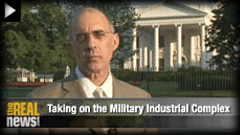

Head of 'The Real News' network Paul Jay is trying to save the news media, one viewer at a time. Horrified at the corporate media's acquiescence to the White House during 9/11 and the run up to the war in Iraq, Jay decided to set up his own organization to provide the public with real, unadulterated journalism that would effectively challenge power regardless of the political environment.
'The Real News' produces daily thought provoking online video segments on current events, using a network of international journalists, academics and analysts to provide sober analysis without corporate spin. The Real News accepts no government funding, not corporate sponsorship, and no advertising. It is a subscriber-based model that strives for complete autonomy.
If you have not been affected by the recession, and you can spare a few dollars a month, The Real News is one of the worthiest causes around. It is a legitimate and serious force for real change, but can survive only if it is funded. Read my interview with Jay below, and if you agree with his vision, please donate. As their slogan says 'The Future Depends On Knowing'.
The U.S media system is unique in that is has no national broadcast programming services. It is supposed to promote competition between media outlets, and cater to the demands of the public. Do you think this has failed as a system?
I guess success or failure depends on what your objectives are. The objective of the American Media system was debated really in the early days of radio. And there was a rather serious debate as to whether to have a serious BBC style public broad caster, a debate that went on again during the early days of television to some extent. In fact there was a debate that was a little bit that was influenced by what was going on in Canada. The debate was very fierce in Canada that was whether to have again, a BBC model or a pure market driven model. The U.S system very early on from radio to television - the idea of public airways and airways being a public asset was never taken very seriously. It was always market driven, it was always simply for profit, and the line between advertising and news was always extremely blurred. So you could say the system is a success if your objective is that it should be a profit center for big corporate media companies, but if the objective is news information that gives people a real sense of what the world is about, then I guess you would have to call it a failure. But that never was the objective.
In what way do you think corporate conglomerates affected the art and role of journalism in the U.S in comparison to the European or the Canadian model?
There has been a shift in the last 30-40 years which a lot of people have discussed, in the early days of television news, CBS, Edward R. Murrow, Walter Cronkite, these sorts of people, there was a sense that the news department had a role of creating a sense of integrity or profile about the brand. There was some sense of social duty in television news, and in some of the situations like with Murrow or with Cronkite, their own influence as individuals was quite strong, to the extent that they had their own standards and they could fight for them. That has over the last decades, certainly waned, and the idea of the corporate media news as a profit center and as an entertainment center has become dominant. I think that it is not that new that this is happening, if you go back to the film 'Network', which I think must be about 30 years old by now, where television news as entertainment is thoroughly skewered by Patty Chayefsky (the writer), but go back even further to the speech by Edward R. Murrow that's played in the film 'Good Night And Good Luck' with George Clooney, that was a vicious denunciation of what news had become, that speech must have been 40 or 50 years ago. So the decline and role of television news as being essentially an echo chamber for mythology, a way for the official version of things to be dispensed is not new. What you could say is new is that before 9/11 there was still some sense in television newsrooms and I guess in print too, but we're focused more on TV, there was still some sense that television news had role of holding power accountable, there was some sense that there was still a place where journalism could dig out facts. I say some because it was still in the context of the corporate news that's mostly profit driven, and not driven first and foremost by seeking facts, but there were some. But something significant happened after 9/11, and that was a return to an atmosphere that was akin to McCarthyism - outright use of fear in television newsrooms to the point where people like Tom Fenton, who was the foreign correspondent for CBS News for 25 years said that to criticize the White House in a newsroom after 9/11, one would fear of being called a traitor, and Dan Rather told the BBC in an interview that, and he didn't say this to an American news source, that if you were to criticize Bush during 9/11 and during the early days of the Iraq war, he compared it to being a traitor in a township in South Africa, and he said you could have the flaming tire of patriotism put around our neck. A very important lesson was learned, and I think Tom Fenton is the one who talks about this, which is that newsrooms really can be outright intimidated.
To continue reading my interview with Paul, click here.
Ben Cohen is the Editor of The Daily Banter.com